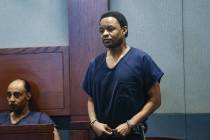Protection orders kept secret
Family Court officials apparently have been making up the law for the past six months by implementing a policy to seal temporary protection order documents, contrary to state laws that ensure those records remain open and available to the public.
The Review-Journal discovered the unwritten policy May 24 while investigating domestic violence allegations against a Las Vegas police captain.
When a reporter went to the Family Court records window and asked for a copy of the temporary protection order application filed by the captain's wife, a clerk explained that all such records were sealed.
On a return trip the next day a different clerk gave the same answer, saying a court administrative order had sealed the records since Jan. 1.
"It appears somebody decided to preempt the Supreme Court with some administrative policy," said Barry Smith, executive director of the Nevada Press Association. "They don't have the authority to decide something like that."
That authority lies with the Nevada Supreme Court, whose Commission on Access, Preservation and Sealing of Court Records will hold a public hearing at 9 a.m. Thursday to discuss public access and other issues related to temporary protection orders.
Under state law, such documents are open and available to the public.
Protection order documents have played key roles in recent reporting by the Review-Journal, including stories on domestic violence allegations against Las Vegas Justice of the Peace Tony Abbatangelo and accusations of improper conduct with a teenage relative by former Henderson police officer Luke Morrison, who pulled the trigger in the killing of an ice cream truck driver.
Court officials said last week they were unaware of any policy change and the temporary protection order documents should have been released by the records clerks.
"That bucks a trend," Chief Judge T. Arthur Ritchie Jr. said last Tuesday . "It seems odd to me. Unless there's a statutory basis to seal something, we don't seal it."
Court Executive Officer Steven Grierson agreed, blaming the policy change on a misunderstanding by a supervisor in the clerk's office.
The misunderstanding arose from discussions about a federal law that prohibits certain protection order documents from being published electronically, he said. The court's policy was supposed to apply only to documents on computers, but a supervisor mistakenly took it a step further, Grierson said.
"Somebody over-interpreted," he said.
"They just assumed that all the files were not to remain public."
Grierson said the issue was resolved after the Review-Journal's inquiries.
The Review-Journal eventually obtained the protection order documents in the Las Vegas police captain case.
On Thursday, Ritchie still was not aware why access to the protection order documents had been denied and said there had been no formal policy change.
"It sounds to me that it was a misunderstanding" at the records department, he said. "As to that issue, when it came to our attention we fixed it. I don't know what else to say. We don't have a written policy or anything else that would do anything other than the law requires."
It wasn't the first time reporters have been stymied by Family Court officials.
After a November child support hearing for Michael Jackson's deathbed doctor, bailiffs detained about a dozen journalists in the courtroom while Conrad Murray was escorted from the building.
After reviewing the incident, Ritchie said the reporters were held for security concerns. Though he admitted the bailiffs should have allowed the reporters to freely leave the courtroom, Ritchie said there was no wrongdoing and nobody would be disciplined.
Judge Gloria Sanchez, who presides over Family Court, also said she was unaware of any policy change regarding temporary protection orders and wouldn't speculate on its origins.
She focused her comments on the upcoming state Supreme Court commission hearing and the suggestions written by Family Court officials that call for almost no public access to temporary protection orders.
The public should have the right to know when a protective order has been filed but not the details of the order, according to the written suggestions submitted to the state Supreme Court.
Family Court officials also concluded that "the written record is often skewed" by one-sided documents and the public is too ignorant to make an informed judgment.
"An untrained legal eye would not necessarily realize this fact and jump to conclusions," the submission said.
Sanchez, who gave a copy of the suggestions to the Review-Journal, said it's difficult to balance the public's right to know versus the victim's right to safety.
"Victim's safety is our first and largest priority," she said. "We're really proposing the courts look cautiously about exhibits and their allegations. Some of them are horrifying and not always accurate, sometimes outrageously inaccurate."
The Family Court document concluded that domestic violence is a very "private crime."
"Arrests are not readily made in a majority of those cases where a protection order is sought. The shame and humiliation attached to being a victim, or the child in a hostile home, are hard to shed," the document said.
"Neither the public, the media nor data collectors need to know what happened at the next-door neighbor's house last night."
But once the government becomes involved through the courts or law enforcement and taxpayer money is being spent, government officials must be held accountable for how they respond, said the press association's Smith, an open-government advocate.
And the government cannot be held accountable without public access to the information it used to make decisions, he said.
What bothers Smith the most, he said, is an attitude by government officials who believe only they need to know certain information.
"If the government doesn't think anyone needs to know about it, then the government doesn't need to ask," he said.
Contact reporter Brian Haynes at bhaynes
@reviewjournal.com or 702-383-0281. Contact
reporter Mike Blasky at mblasky@reviewjournal.com
or 702-383-0282.























